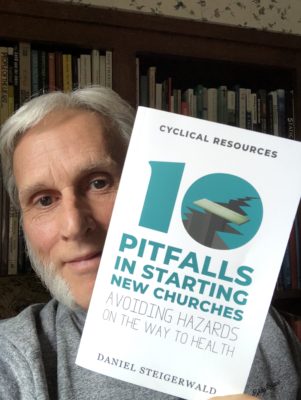Has “Missional” Outlived Its Usefulness?
I recently had a good exchange with Alan Hirsch on Facebook about what I perceive as the waning usefulness of the word “missional” (not suggesting the movement attached to it is waning at all). Here’s that conversation. I’d be curious to hear what others think.
Alan Hirsch: I have been recently asked to do a short article on whether the missional movement has had its day. I won’t give you my full answer as that will come out sometime, but I am more convinced than ever of the rightness of the movement. The degraded state of contemporary evangelical Christianity necessitates the very focii that the missional movement brings—a radical recentering on the life, teachings, and ministry of Jesus Christ; a theology of lordship and not just personal salvation; a call to integrate justice into mission; incarnational forms of church planting; a recovery of full biblical typology of ministry (APE+ST); a recovery of the priority of discipleship; calling the church to rally around God’s purposes in the world as opposed to theological navel-gazing; etc.. We need these now more than ever! We must not stop in our efforts to remissionalize the church, in fact I believe we need to double down on them. There is no Plan B!
Dan: I wonder Alan if it’s more about “missional” that’s not enduring rather than what we use that term to describe. Missional conveys instrumentality, as if God’s primary intention for the people of God is to get work done through us. And in the ears of some indigenous leaders I know, the word carries undertones of the church again bringing or imposing something upon recipient populations. Missional continues to be an easy setup for a stance that focuses more on what we “do to host cultures” and what we “bring to them than what we “do with” and “do in response to” culture (the latter requiring a patiently acquired insider-ship conducive to incarnating the gospel appropriately).
Alan: I hear you here Dan. But surely this is what the missional movement was trying to get attention to in the first place. To wake a up the self-obsessed church to its obligations as God’s prime missional agency (instrument) in the world. That had been factored out of the equation for so long. What is the plan B? Go back to church as we know it??
Dan: I’m not suggesting going back to anything. But allowing some re-language-ing to emerge from a broader set of voices – voices that just like you want to stay true to embodying the gospel in a host of ways.
Alan: Give me examples–other than me–Dan. Help me understand.
Dan: How to possibly do that via FB w brevity in view ???. Here’s a quick attempt at some examples, though maybe these aren’t what you have in mind:
1. “Joining God in God’s mission” – how that’s discerned is often way too narrow, even oftentimes projecting our own biases. We need more voices of the contemplative activist streams, those discerning “shalom resonance” in creation/relationships/culture and in human longings, not to navel-gaze but to cultivate those starting points often missed by those dipping in superficially with a “we have the answer” fix-it or rescue mentality.
2. Indigenous perspectives need to be incorporated, esp those that move us beyond “Kingdom” and conquest language/imagery (Randy Woodley’s Shalom and the Community of Creation, with accent on the harmony construct behind all creation, speaks well to this). And Erna Hackett and others speaking into decolonizing our theology, which includes scrutinizing that word “missional” as too Western Euro-Am white male freighted.
3. Andy Crouch for years has been espousing metaphors of our vocation in culture as cultivators and creators (artists and gardeners). These organic metaphors preserve the essence of missional, without having to resort to a concept that sounds like business alignment language. We need concepts that carry more holism. I recall Dwight Friesen blogging this about 15 years ago, and I think he is still right: “Mission often paints mental pictures of a task to complete, more than pictures of a life to live. Like the Blues Brothers on their “mission from God,” anything that did not obviously contribute to the completion of their mission was treated without respect. So when we see individual conversion, or serving marginalized peoples, or saving our planet as THE mission then everything else plays second fiddle. Because of this subtle singularity communicated through missional language, dualism is reinforced. This dualism suggests, “missional is important, everything else is less important.” Church work is important – web design is less important; working in a homeless shelter is important – working at the holiday inn is less important; working to save the rain forest is important – doing yard work at home is less important. We don’t believe that God is more concerned with what we do than who we are; God has always been interested in us as whole beings.”
4. More inside-out, less outside-in. Len Hjalmarson once pointed out to me that the Hebrew term for “whole hearted devotion” is literally “a heart of shalom. A driven restlessness or impatience or pragmatism or rescue mentality will often undermine the very essence of what we’re after in terms of sustained embodiment of the gospel of shalom. To sow shalom we need to maintain hearts of shalom. As Len puts it, we need “a missional spirituality” or” an attentive and active engagement of embodied love for God and neighbor expressed from the inside-out.”
This can sound too individualistic, but of course every form of ecclesia needs to cultivate such a shalom heart, and in doing so we need to always see personal/communal transformation by the gospel as the other side of the activist coin. Like NT Wright once said: “There is ultimately no justification for a private piety that doesn’t work out in actual mission, just as there is ultimately no justification for people who use activism in the social, cultural or political sphere as a screen to prevent them from facing the same challenges within their own lives – the challenge, that is, of God’s Kingdom, of Jesus’ lordship, and of the Spirit’s empowering. If the gospel isn’t transforming you, how do you know it will transform anything else?” – N.T. Wright, Surprised by Hope, 170.
Alan: Wow Dan. Thanks mate. Points well made and taken. My only concern is that some of this is so broad as to lose the particular distinctives, a specificity, to which missional is pointing to—when everything is missional, then nothing is missional. This becomes a way of missing the very point of recovering missional identity and praxis. But, overall I think these are good additions and nuances.



